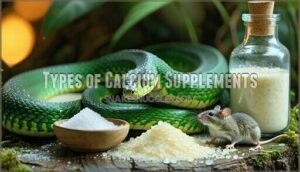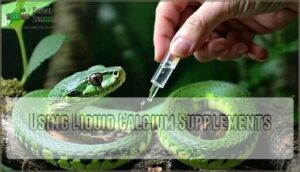This site is supported by our readers. We may earn a commission, at no cost to you, if you purchase through links.

This method guarantees your snake gets essential calcium without disrupting their natural feeding behavior.
Choose supplements that balance calcium with phosphorus and include vitamin D3 for proper absorption.
Dust prey lightly – a thin coating works better than heavy dusting that might discourage eating.
For snakes eating whole prey regularly, supplementation isn’t always necessary since mice and rats contain natural calcium.
However, younger snakes, breeding females, or those on limited diets benefit from careful supplementation.
The key lies in understanding when your snake actually needs extra calcium and avoiding the common pitfalls that many owners encounter, which requires a balance of calcium and phosphorus for proper absorption, and being mindful of the potential for heavy dusting.
Table Of Contents
- Key Takeaways
- Snake Calcium Needs
- Choosing Calcium Supplements
- Calcium Supplementation Methods
- Calcium and Vitamin D3 Relationship
- Monitoring Snake Health
- Supplementing Snake Diets
- Maintaining Optimal Snake Health
- Frequently Asked Questions (FAQs)
- Do snakes need a calcium supplement?
- Can a snake eat calcium & vitamin D3?
- What are the best vitamins for a healthy snake?
- Do snakes need supplements?
- What nutrients do snakes need?
- Do hognose snakes need vitamins?
- What is the best calcium supplement for reptiles?
- Can you give a reptile too much calcium?
- How often should I supplement calcium?
- Can I use human calcium supplements?
- Conclusion
Key Takeaways
- Dust prey with reptile-specific calcium powder – You’ll get the best results by lightly coating frozen-thawed rodents with calcium powder before feeding, ensuring your snake gets essential calcium without disrupting natural feeding behavior.
- Choose the right supplement type based on UVB exposure – You should use calcium with vitamin D3 if your snake lacks UVB lighting, or calcium without D3 if they receive proper UV exposure, since too much D3 can cause dangerous toxicity.
- Most healthy snakes don’t need supplementation – You won’t need to supplement if you’re feeding quality whole prey like mice and rats, since these provide complete nutrition naturally, making supplements unnecessary for most adult snakes.
- Focus supplementation on high-risk situations – You should prioritize calcium supplementation for young, growing snakes, breeding females, sick or stressed reptiles, and those eating poor-quality prey, rather than supplementing routinely.
Snake Calcium Needs
Your snake’s calcium needs aren’t just important—they’re absolutely critical for preventing serious health problems like metabolic bone disease.
Without proper calcium levels, your pet can develop weak bones, muscle tremors, and even life-threatening complications that’ll have you rushing to the emergency vet, which is a critical situation.
Calcium deficiency turns your tough snake into a fragile, trembling pet facing emergency vet visits.
Importance of Calcium for Snakes
While your snake might seem tough as nails, calcium for snakes acts like the foundation of a house.
Without proper snake calcium intake, your pet’s bone strength crumbles, muscle function weakens, and overall wellbeing suffers.
Calcium deficiency snakes develop serious body structure problems that affect growth support and basic movement, making snake bone health absolutely essential.
Role of Calcium in Bone Health
Calcium acts like the foundation of your snake’s skeletal system, supporting bone density and muscle function throughout their life.
Without proper calcium absorption, your pet’s bones become weak and brittle, leading to serious health complications.
Here’s what calcium does for your snake’s bones:
- Builds strong skeletal development – Creates the framework that supports your snake’s entire body structure
- Maintains bone density – Keeps bones thick and resistant to fractures during normal movement
- Powers muscle function – Enables proper muscle contractions for slithering, striking, and constricting
Snake calcium deficiency creates a domino effect that starts with poor calcium and bone health. Your snake’s body will actually steal calcium from bones to maintain other essential functions, weakening the skeletal structure over time. This process makes MBD prevention absolutely critical for long-term snake bone health.
Preventing Metabolic Bone Disease
Most snake owners don’t realize that calcium deficiency can sneak up like a thief in the night.
Without proper dietary calcium and UVB exposure, your snake’s bones gradually weaken.
Metabolic bone disease develops when calcium levels drop, causing painful fractures and deformities.
Regular reptile calcium supplements prevent this condition, but watch for supplement overdose – too much vitamin D3 disrupts bone health just as badly as too little.
Radiographs can help reveal bone density changes.
Choosing Calcium Supplements
You’ll find calcium supplements in powder, liquid, and block forms, but powder remains the most effective choice for dusting prey before feeding.
Quality matters substantially when selecting supplements, so stick with reptile-specific brands like Rep-Cal or Zoo Med that clearly list ingredient quantities and avoid excessive fillers.
Types of Calcium Supplements
You’ll find several calcium supplement types designed specifically for snake health.
Each form offers unique benefits depending on your snake’s needs and feeding preferences. Ensuring snakes receive the necessary calcium intake is essential for preventing health issues.
- Calcium carbonate powder – Contains 40% elemental calcium with micro-fine particles that stick well to prey items
- Calcium citrate liquid – Features higher bioavailability than powder forms, perfect for snakes refusing dusted prey
- Calcium-phosphorus blends – Maintains proper 2:1 ratios to prevent mineral imbalances in growing reptiles
Selecting Reptile-Specific Supplements
Why settle for generic supplements when reptile-specific formulations exist?
Choose trusted brands like Rep-Cal and Zoo Med that prioritize species specificity and ingredient clarity. These reptile calcium supplements avoid excessive filler content while offering various supplement forms.
Quality snake calcium supplement brands guarantee proper dosing for calcium for snakes, unlike human products that lack reptile supplements expertise.
Avoiding Low-Quality Supplements
Many supplement companies exploit the fact that reptile supplements aren’t FDA-regulated, leading to mislabeled products with excessive filler content.
When choosing quality reptile supplements, scrutinize ingredient clarity and avoid brands stuffing their products with cheap fillers.
Reputable brands like Rep-Cal invest in third-party testing and transparent labeling.
Don’t let flashy marketing fool you—cost analysis often reveals that expensive doesn’t always mean better, while suspiciously cheap supplements usually contain unregulated additives that could harm your snake.
Calcium Supplementation Methods
Proper calcium supplementation guarantees your snake maintains strong bones and avoids metabolic bone disease through several effective delivery methods.
You can choose from dusting prey, using liquid supplements, or gut-loading feeder animals to meet your snake’s calcium requirements.
Dusting Prey With Calcium Powder
Dusting technique transforms plain prey into calcium-rich meals for your snake.
Simply coat frozen-thawed rodents with reptile calcium powder before feeding. Roll the prey gently to guarantee proper powder adhesion without creating messy clumps.
This calcium source method maximizes snake calcium intake while minimizing supplement waste, as most snakes readily accept dusted prey without hesitation.
Many owners purchase pre-dusted rodents for convenience.
Using Liquid Calcium Supplements
Liquid calcium supplements offer convenient administration methods when dusting prey isn’t practical.
You’ll find these supplements easier to measure precise liquid dosage compared to powder forms. Most reptile brands provide dropper bottles for accurate calcium absorption delivery.
However, palatability concerns arise since snakes may reject treated prey. Reptile calcium liquid is readily available online.
Storage guidelines recommend refrigeration after opening to maintain potency. Compare trusted brands like Rep-Cal versus Zoo Med for quality assurance when selecting snake calcium supplements.
Gut Loading Prey With Calcium
Beyond traditional dusting methods, prey gut-loading offers superior calcium absorption rates for your snake.
This technique involves feeding calcium-rich foods to prey insects 24-48 hours before offering them to your reptile.
Key gut-loading benefits include:
- Enhanced calcium intake through whole prey nutritional value
- Better absorption compared to surface dusting alone
- Natural reptile calcium source delivery system
Proper gut-loading duration maximizes your snake’s calcium source while supporting healthy health.
To guarantee insects are nutritionally complete, gut loading is essential.
Calcium and Vitamin D3 Relationship
Calcium and vitamin D3 work together like a perfect team – your snake can’t absorb calcium properly without enough D3 to help the process along.
You’ll need to decide between calcium supplements with or without D3 based on whether your snake gets UVB lighting, since too much D3 can actually harm your pet, and it’s crucial to find the right balance to ensure your snake’s health, with D3 playing a vital role.
Importance of Vitamin D3 for Calcium Absorption
Vitamin D3 acts like calcium’s personal assistant, helping your snake’s body actually use the calcium you provide.
Without adequate D3 synthesis through UVB exposure or supplements, calcium absorption drops dramatically.
This partnership prevents MBD and supports proper calcium regulation, as calcium and vitamin D3 work together seamlessly for ideal health, much like dance partners – they are essential for proper calcium regulation.
Using Calcium With or Without D3
Your snake’s UVB exposure determines which calcium supplement to use.
Choose calcium without D3 when your snake receives adequate UVB lighting, allowing natural vitamin D3 synthesis for proper calcium absorption.
Select calcium with D3 for snakes kept without UVB, as they need dietary vitamin D3 to absorb calcium effectively and prevent Metabolic Bone Disease (MBD).
Maintaining a proper diet can help prevent vitamin deficiency prevention, which is crucial for the overall health of your pet snakes, and ensuring they receive the necessary vitamin D3 is essential.
Risks of Over-Supplementation With D3
Over-supplementation with vitamin D3 creates serious health risks that you can’t ignore.
Too much vitamin D3 turns your snake’s lifesaver into a silent killer.
Hypervitaminosis D causes calcium overdose, leading to soft tissue calcification throughout your snake’s body. This D3 toxicity damages essential organs permanently.
- Kidney damage – Excess calcium deposits block normal kidney function
- Heart problems – Calcification affects cardiac muscle and blood vessels
- Digestive issues – Calcium buildup disrupts normal gut processes
- Neurological symptoms – Brain calcification causes seizures and coordination loss
- Bone deformities – Paradoxically, too much D3 weakens bone structure
Monitoring D3 levels prevents these devastating complications from calcium and vitamin D3 oversupplementation.
Monitoring Snake Health
You’ll need to track your snake’s health consistently to verify calcium supplementation is working effectively.
Regular monitoring helps you catch potential deficiencies early and adjust your approach before serious problems develop, which is crucial for maintaining your snake’s overall health.
Regular Weight Checks and Body Condition Scoring
Three key measurements help you track your snake’s overall well-being effectively.
Weekly weight checks reveal important weight trends that signal nutritional changes or health issues.
Condition scoring involves gently feeling along your snake’s spine and sides to assess body fat and muscle tone.
These feeding adjustments and hydration assessment practices support proper growth monitoring and snake nutrition management, helping you spot calcium deficiencies before they become serious snake health problems requiring expensive snake supplements interventions, which aids in snake nutrition.
Fecal Examinations and Blood Work
Laboratory testing serves as your reptile’s health compass.
Fecal analysis reveals parasites in over 90% of captive snakes, while blood parameters detect calcium deficiency and organ function problems before symptoms appear.
Essential health screening benefits:
- Early parasite detection – Fresh samples catch 93% of internal parasites before they cause serious damage
- Calcium level monitoring – Blood work identifies nutritional deficiencies that lead to metabolic bone disease
- Organ function assessment – Kidney and liver problems show up in blood parameters before visible symptoms
- Treatment guidance – Results help your reptile vet create targeted treatment plans
- Prevention focus – Regular screening prevents minor issues from becoming major health crises
Both fecal examination and blood work provide vital data about your snake’s nutritional status and overall health.
Veterinary Guidance for Accurate Diagnosis
Your reptile vet’s expertise becomes invaluable when diagnostic tools reveal potential calcium deficiency snakes.
Professional veterinary consultation helps interpret results from blood work and fecal tests accurately. These specialists understand snake calcium needs better than general practitioners.
They’ll create targeted treatment planning for calcium supplements snakes while establishing preventative care protocols.
Don’t hesitate seeking specialist referrals when calcium issues persist.
Supplementing Snake Diets
Most snakes eating whole prey don’t need extra supplements since mice and rats provide all essential nutrients naturally.
You’ll only need to add calcium or vitamins during illness, breeding, or if you’re feeding low-quality prey items.
Whole Prey Diet and Supplementation
When you feed your snake whole prey like mice or rats, you’re providing a complete nutritional package.
These natural meals contain bones, organs, and muscle that deliver balanced calcium and essential nutrients.
However, prey source matters substantially for ideal nutrition.
- Prey Gut Loading – Feed prey calcium-rich foods before offering them to your snake
- Whole Prey Quality – Choose healthy, well-fed prey from reputable suppliers
- Natural Calcium Sources – Bones in whole prey provide bioavailable calcium naturally
- Supplement Timing – Most healthy snakes eating quality whole prey don’t need additional calcium supplements
Situations Where Supplementation is Necessary
While healthy snakes eating whole prey rarely need calcium supplementation, reptiles, certain situations demand intervention.
Poor prey quality from malnourished feeders creates calcium deficiency snakes. Sick/stressed snakes recovering from illness benefit from temporary supplementation. Breeding females require extra calcium during egg production.
Snakes that lack UVB lighting need vitamin D3 for proper absorption. Always seek vet consultation before starting snake supplements.
| Situation | Risk Level | Supplementation Need |
|---|---|---|
| Poor Prey Quality | Medium | Dust prey occasionally |
| Breeding Females | High | Monthly during cycles |
| Lack UVB/Illness | Critical | Vet-supervised protocol |
Common Mistakes With Supplementation
Without proper knowledge, you’ll make costly mistakes that harm your snake’s health.
Over-supplementation creates dangerous hypercalcemia risks, while using incorrect supplements designed for other animals proves ineffective.
Many owners neglect diet quality, thinking calcium supplements alone solve nutritional problems.
- D3 overdose danger: Excessive vitamin D3 causes toxic buildup since snakes can’t self-regulate like with UVB exposure
- Wrong supplement types: Using dog or bird calcium products instead of reptile-specific formulations creates absorption issues
- Neglecting diet foundation: Relying on supplements while feeding poor-quality prey ignores the root nutritional problem
- Calcium oversupplementation: Too much calcium blocks other essential minerals, creating new deficiencies despite good intentions
- Ignoring calcium deficiency snakes symptoms: Missing early warning signs like lethargy or soft bones delays proper treatment
Maintaining Optimal Snake Health
Maintaining ideal snake health goes beyond just feeding them regularly. You’ll need to balance proper nutrition, lighting, and veterinary care to keep your snake thriving for years to come.
Balanced Diet and Proper Hydration
Your snake’s overall wellness depends on more than just calcium supplements.
A well-rounded diet featuring varied prey like mice, rats, and properly gut-loaded insects provides thorough nutrition.
Consistent water availability supports proper hydration, while strategic feeding schedules promote maximum nutrient absorption.
Quality prey variety combined with effective hydration methods creates the foundation for excellent snake health and calcium utilization.
UVB Lighting and Calcium Intake
Proper UVB lighting works hand-in-hand with calcium intake to keep your snake healthy.
When UVB rays hit your snake’s skin, they trigger vitamin D3 synthesis, which helps absorb calcium from food. Different species need varying UVB based on habitat.
- UVB Benefits: Natural D3 production reduces need for D3 supplements
- Lighting Spectrum: Use reptile-specific UVB bulbs for maximum calcium absorption
- Basking Behavior: Position lights where snakes naturally bask for maximum exposure
Regular Veterinary Consultations for Optimal Health
Biannual veterinary consultations provide expert advice and early detection of health issues before they become serious problems.
Your reptile vet creates personalized plans customized to your snake’s specific needs and monitors snake calcium intake effectively.
| Consultation Benefits | Health Impact |
|---|---|
| Preventative care screening | Catches deficiencies early |
| Blood work analysis | Reveals calcium imbalances |
| Nutrition plan review | Optimizes reptile supplements |
| Behavioral assessment | Identifies stress factors |
| Treatment adjustments | Prevents over-supplementation |
Regular veterinary consultation guarantees your snake nutrition stays on track through professional monitoring and guidance.
Frequently Asked Questions (FAQs)
Do snakes need a calcium supplement?
Most snakes eating whole prey don’t need calcium supplements since complete prey provides balanced nutrition. You’ll only need supplements for sick snakes, poor-quality prey, or breeding females.
Can a snake eat calcium & vitamin D3?
Yes, you can give your snake calcium and vitamin D3 supplements.
These come as powders that you dust onto prey before feeding.
Choose reptile-specific brands and follow dosage instructions carefully to avoid over-supplementation.
What are the best vitamins for a healthy snake?
Like a well-oiled machine, your snake’s body thrives on whole prey’s complete nutrition. Healthy snakes eating mice or rats don’t need extra vitamins—nature’s already packed everything they need inside.
Do snakes need supplements?
Most healthy snakes eating whole prey don’t need supplements since mice and rats provide complete nutrition.
You might consider calcium supplementation for sick snakes, breeding females, or those lacking UVB lighting.
What nutrients do snakes need?
Roughly 95% of captive snake health issues stem from nutritional deficiencies.
Your snake needs calcium, phosphorus, protein, vitamin D3, and trace minerals like zinc and copper for healthy bones, muscles, and immune function.
Do hognose snakes need vitamins?
Hognose snakes eating whole prey don’t typically need vitamins since mice and rats provide complete nutrition.
However, you might consider calcium supplementation if they’re not getting UVB lighting or eating poor-quality prey.
What is the best calcium supplement for reptiles?
Rep-Cal and Zoo Med calcium powders reign supreme among reptile keepers. You’ll want calcium with D3 for snakes without UVB lighting, or plain calcium if they’ve got proper UV exposure.
Can you give a reptile too much calcium?
Yes, you can definitely give your reptile too much calcium. Overdosing causes hypercalcemia and dangerous mineral imbalances. Excessive vitamin D3 worsens this problem. Always follow dosage instructions carefully.
How often should I supplement calcium?
Calcium frequency depends on your snake’s diet and UVB exposure. For whole prey feeders, supplementation isn’t typically needed. If required, dust prey every other feeding or follow vet guidance.
Can I use human calcium supplements?
Just like mixing children’s vitamins into adult meals won’t provide proper nutrition, human calcium supplements aren’t formulated for snakes.
You’ll need reptile-specific supplements with proper calcium-to-phosphorus ratios and appropriate vitamin D3 levels for safe absorption.
Conclusion
Think of your snake’s calcium needs like tending a garden – you can’t just dump fertilizer everywhere and hope for the best.
Successfully supplement snake calcium intake by understanding your pet’s specific requirements rather than following generic advice. Young snakes, breeding females, and those eating limited prey varieties need careful supplementation, while healthy adults on whole prey diets often don’t.
Monitor your snake’s condition regularly and consult a reptile veterinarian for guidance.
Smart supplementation prevents metabolic bone disease while avoiding the pitfalls of overdoing it.
- https://www.reptifiles.com/feeder-insect-nutrition-facts-chart/
- https://www.thebiodude.com/blogs/reptile-and-amphibian-caresheets-with-cited-veterinary-and-herpetology-sources/introduction-to-uvb-part-2
- https://www.merriam-webster.com/dictionary/conclusion
- https://www.evolutionreptiles.co.uk/supplies/medication-and-supplements/calcium-supplements/prorep-calci-dust/
- https://www.snakediscoverystore.com/husbandry/supplements/
















